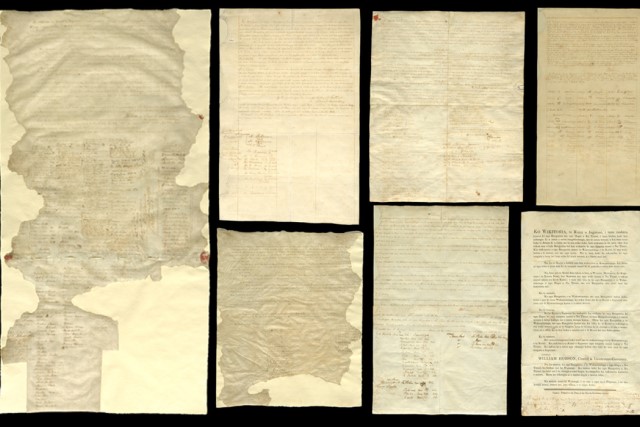Waitangi Tribunal releases report on proposed Treaty Principles Bill and Treaty Clause review
Wed 28 Aug 2024
The Waitangi Tribunal have released Ngā Mātāpono – The Principles: The Interim Report of the Tomokia Ngā Tatau o Matangireia – The Constitutional Kaupapa Inquiry Panel on The Crown’s Treaty Principles Bill and Treaty Clause Review Policies.

The report concerns claims submitted to the Tribunal under urgency regarding Crown policies to progress a Treaty Principles Bill and, separately, to review legislative enactments referring to ‘the principles of the Treaty of Waitangi’ (the Treaty clause review). The Tribunal held the claims at hearings on 9 and 10 May 2024.
This story also gives background information on Te Tiriti o Waitangi, the principles of the treaty, and their relevance to the sexual violence and family violence sector including Te Aorerekura.
The Treaty Principles Bill
The introduction of a ‘Treaty Principles Bill’ was agreed to as part of the National and ACT Coalition Agreement, which includes the commitment to "Introduce a Treaty Principles Bill based on existing ACT policy and support it to a Select Committee as soon as practicable".
Although the Bill is still being drafted, the ACT Party have developed and shared its own proposed treaty principles, which redefine the treaty relationship to protecting:
- the Crown’s right to govern,
- property rights, and
- equality under the law.
ACT’s principles have been drafted without involvement from either Crown or Māori representatives. The Bill would require a binding referendum on ACT’s proposed treaty principles. The Bill has not yet been introduced in Parliament.
For more information about what is being proposed and what this means see legal academic Carwyn Jones' (Ngāi Te Apatu, Ngāti Kahungunu ki Te Wairoa) E-Tangata article.
The pre-publication version of the Waitangi Tribunal’s interim report found that the Treaty Principles Bill, and the Crown’s agreement to support it, are in breach of the treaty principles of partnership and reciprocity, active protection, good government, equity, redress, and the article 2 guarantee of rangatiratanga. They state:
“the evidence before us indicates the Treaty Principles Bill is not necessary to solve any problem; there is no policy imperative that justifies it; it is ‘novel’ in its Treaty interpretations; it is fashioned upon a disingenuous historical narrative; and its policy rationales are unsustainable." (p.134).
They further state that:
“the Treaty/te Tiriti created a foundational relationship for this country founded on a partnership between Māori and the Crown and equality between the tino rangatiratanga and kāwanatanga spheres. The proposed Bill and the Crown’s agreement to pursue it belies the existence of this partnership. Despite the constitutional significance of the Bill’s proposal to amend the Treaty principles and its importance to Māori, the Crown agreed to pursue the policy without any engagement or discussion with Māori. Māori did not want this policy and in fact many have been strongly opposed to it from the beginning. This is a clear failure of the principle of partnership, including the obligations of good faith and reciprocity. It is also a failure of the Crown to respect the tino rangatiratanga of Māori.” (p.135)
The Tribunal found that:
“by engaging with this policy the Crown is sanctioning a process that will take away indigenous rights and reduce the Crown’s Treaty/te Tiriti obligations across the statutory landscape. It has adopted a policy that is contrary to fundamental human and indigenous rights and international law, including ICERD [International Convention on the Elimination of All Forms of Racial Discrimination] and UNDRIP [United Nations Declaration on the Rights of Indigenous Peoples]. It is subjugating the Māori–Crown relationship with little regard to the normative value of the Treaty/te Tiriti in our constitutional framework. It is an attempt to utilise Parliament’s law-making authority to alter Aotearoa New Zealand’s constitutional foundation predicated upon a legal fiction and an attempt to oust the judiciary.” (p.135)
They conclude that:
“the Treaty Principles Bill policy is poorly designed, not informed by consultation with Māori, not justified by robust policy analysis, and risks destroying the very foundation of the constitutional arrangements of this country.” (p.138)
The Tribunal found that the impacts of the policies will be highly prejudicial to Māori. They recommended that:
- "The Treaty Principles Bill policy should be abandoned.
- The Crown should constitute a Cabinet Māori–Crown relations committee that has oversight of the Crown’s Treaty/te Tiriti policies. The Tribunal did not consider it appropriate that these matters are considered by the Social Outcomes Cabinet Committee.
- The Treaty clause review policy [see below] should be put on hold while it is reconceptualised through collaboration and co-design engagement with Māori.
- The Crown should consider a process in partnership with Māori to undo the damage to the Māori–Crown relationship and restore confidence in the honour of the Crown. While the Tribunal noted that this issue was wider than the two specific policies before it in this urgent inquiry, it stated that it made this recommendation based on its findings and the redress that is necessary to remove the prejudice and prevent similar prejudice in the future."
Many organisations oppose the Treaty Principles Bill being introduced or read. Over 150 community groups and civil society organisations have signed an open letter, organised by ActionStation, opposing the Bill and calling on the Prime Minister to stop the Treaty Principles Bill and ensure it is withdrawn before going to select committee. ActionStation Director Kassie Hartendorp (Ngāti Raukawa) said:
"We really wanted to start showing it’s not just Māori who care about this bill. It’s people who have been within civil society and within communities and doing their best to be able to honour Te Tiriti o Waitangi…”
Treaty Clause Review
The treaty clause review is a separate government workstream from the Treaty Principles Bill. Undertaking this review was part of the 2023 Coalition agreement between the National Party and New Zealand First Party. The agreement states that the Coalition will:
"Conduct a comprehensive review of all legislation (except when it is related to, or substantive to, existing full and final Treaty settlements) that includes "The Principles of the Treaty of Waitangi" and replace all such references with specific words relating to the relevance and application of the Treaty, or repeal the references."
Work to scope and implement this review was initially led by Te Arawhiti – The Office for Māori Crown Relations, however, the Waitangi Tribunal report notes that responsibility for the review has since been transferred to the Ministry of Justice.
The Tribunal’s report concludes that the outcomes of the review are ‘pre-determined’, and that by failing to consult with Māori on a matter that will have great significance to them, the Crown “has not to date acted honourably and in good faith in pursuing the review.” The report goes on to state that:
"The review is likely to remove or narrow existing Treaty clauses which will in turn remove Treaty/te Tiriti protections that currently exist in New Zealand law. While these protections are imperfect, they nonetheless provide a means for iwi, hapū, and whānau to both hold the Crown to account and seek redress through the courts. Reducing these protections would therefore impact the rights of Māori to access justice to have their rights under the Treaty/te Tiriti realised, which is in breach of the principles of equity and redress. The Crown also has an obligation to actively protect the rights and interests of Māori. To remove or limit the effect of the Treaty/te Tiriti protections contained in Treaty clauses is a self-evident breach of the principle of active protection." (p. 183).
Information and resources on treaty principles
Te Tiriti o Waitangi
Te Tiriti o Waitangi is the agreement between hapū and the Crown that was debated and signed by representatives of each at Waitangi in 1840. It consists of three written articles, promising:
- Crown right to ‘kāwanatanga’, or authority over its own people (at the time, an estimated 2000 English people were here. This article makes clear the Crown’s responsibility to control them, just as Māori would expect hapū to control their own people).
- Rangatira and hapū ongoing ‘tino rangatiratanga’, or complete authority, which is sometimes translated as sovereignty or self determination (this article is consistent with political arrangements at the time, and the earlier He Whakaputanga o te Rangatiratanga o Nu Tireni). Also, rangatira could sell land to the Crown’s agent at a price agreed to by both.
- Māori all the rights and protections of English citizens. The ‘lawlessness’ of English manuhiri was a key problem the Treaty was trying to solve. This article and the first promise that the Crown will protect Māori just as it would protect its own citizens.
For information about the difference between Te Tiriti o Waitangi and the Treaty of Waitangi, see Professor Margaret Mutu's (Ngāti Kahu, Te Rarawa, Ngāti Whātua) article Enhancing the mana of Te Tiriti. Also see see Tiriti vs Treaty, and challenging 'Treaty principles' from the government's New Zealand History information on Teaching te Tiriti o Waitangi.
The principles of the treaty
Te Ara Whiti describe the history of the principles of the treaty. The first piece of New Zealand legislation to refer to the principles was the Treaty of Waitangi Act 1975, which established the Waitangi Tribunal. The Act says that Māori can bring a claim to the tribunal about a Crown policy or practice (amongst other things) which was or is ‘inconsistent with the principles of the Treaty’.
Many pieces of legislation have since incorporated ‘principles of the Treaty’, however, there is no single list of principles. Instead, principles have been developed and interpreted through a range of Crown controlled mechanisms and processes including (amongst other things) court cases, new laws, Waitangi Tribunal findings and a 1989 government statement. The Crown has not partnered with Iwi, hapū and other Māori organisations in the development of treaty principles.
The Treaty of Waitangi Act 1975 requires that the Waitangi Tribunal look to both the Māori text of Te Tiriti and the English draft in order to determine how ‘the principles of the treaty’ should be applied. Carwen Jones explains that principles of the treaty do not accurately reflect Te Tiriti:
"The use of the phrase "the principles of the Treaty" is an attempt to reconcile the Māori text of Te Tiriti with the English draft. More specifically, the concept attempts to reconcile Te Tiriti with the view that Crown sovereignty is absolute and exclusive and does not allow space for the exercise of other authority. Exclusive and absolute Crown sovereignty is not consistent with the guarantee of tino rangatiratanga to Māori in Te Tiriti. In this way, Treaty principles reflect a significantly watered-down version of Te Tiriti."
For a more comprehensive explanation of treaty principles, including examples of treaty principles that have been identified and applied, see Carwyn Jones’ primer on Treaty principles (2024).
The Treaty of Waitangi and Te Aorerekura
Te Aorerekura, the national strategy to eliminate family violence and sexual violence, explains the relationship between Māori values, the Treaty of Waitangi and Te Aorerekura:
“The Treaty of Waitangi |Te Tiriti o Waitangi, te ao Māori, and whānau-centred approaches are central to Te Aorerekura. They provide a unique perspective for Aotearoa New Zealand about how family violence and sexual violence can be eliminated and how safety and wellbeing can be realised for all people.”
Te Aorerekura recognises the importance of building from a healthy relationship between Tangata Whenua and Tangata Tiriti, and the potential of this for reproducing safe, equitable relationships. It aspires to be a framework with a safe, equitable relationship at its centre. The question of how to support such relationships is repeated throughout Te Aorerekura, for example in engaging with the many communities impacted by violence. Rather than rolling out a single repeated template for working with communities, or a single set of goals or needs to be met, Te Aorerekura invites communities to explore what they each need to thrive.
Te Aorerekura explains the benefit of this approach:
“The Treaty of Waitangi affords Tāngata Tiriti the same rights to access equitable options. Te Aorerekura draws on Te Tiriti o Waitangi, mātauranga Māori and te ao Māori values to envision a different expectation of how to achieve safety and wellbeing for all people in Aotearoa New Zealand.”
Related resources
For more information on Te Tiriti, the treaty and treaty principles see:
- Ani Mikaere’s (Ngāti Raukawa, Ngāti Porou) chapter Te Tiriti and the Treaty: seeking to reconcile the irreconcilable in the name of truth from her book Colonising myths - Māori realities: He rukuruku whakaaro (2011).
- Carwyn Jones' primer on Treaty principles (2024).
- Ako Aotearoa has shared a short collection of notable commentaries related to The Treaty of Waitangi (2024) (Ako Aotearoa supports teachers, trainers and educators on the tertiary sector).
- Community Research's podcast series Te Tiriti 2024 and Beyond that looks at the history and kōrero about our constitution, He Whakaputanga o te Rangatiratanga o Nu Tireni and Te Tiriti o Waitangi. This builds on their previous 2022 Te Tiriti Kōrero podcast series.
- Independent consultant, Groundwork trainings, Treaty Principles explainer, and other resources to support tangata tiriti. See their June 2024 Pānui for more details.
- Chapters 8, 9 & 10 of Waitangi Tribunal Claim 1040, Te Paparahi o te Raki (Northland), which give a good overview of the context surrounding the signing of Te Tiriti and how effect has been given to Te Tiriti over time.
Related media
Understanding the Waitangi Tribunal’s report on the Treaty Principles Bill, The Spinoff, 02.09.2024
Margaret Mutu - Perspective on Govt Actions Towards Te Tiriti, Te Hiku, 23.08.2024
National opts to deepen the divisions with Māori, The Post, 10.08.2024
Ferris puts tribunal boost bill in ballot, Waatea News, 31.07.2024
Opposition mounts ahead of draft Treaty Principles Bill, Newsroom, 17.07.2024
Hekia Parata backs boycott of Act’s treaty principles select committee, The Spinoff, 15.07.2024
Treaty Principles Bill: Māori translators pen letter over 'deeply flawed translations', RNZ, 03.07.2024 (see the open letter, shared by Waatea News)
Government stops putting general Treaty of Waitangi clauses in legislation, NZ Herald, 13.03.2024
Leaked ministry doc warns Bill could break spirit and text of Treaty, One News, 19.01.2024
Image: pages from Te Tiriti o Waitangi, from Te Rua Mahara o te Kāwanatanga | Archives New Zealand





